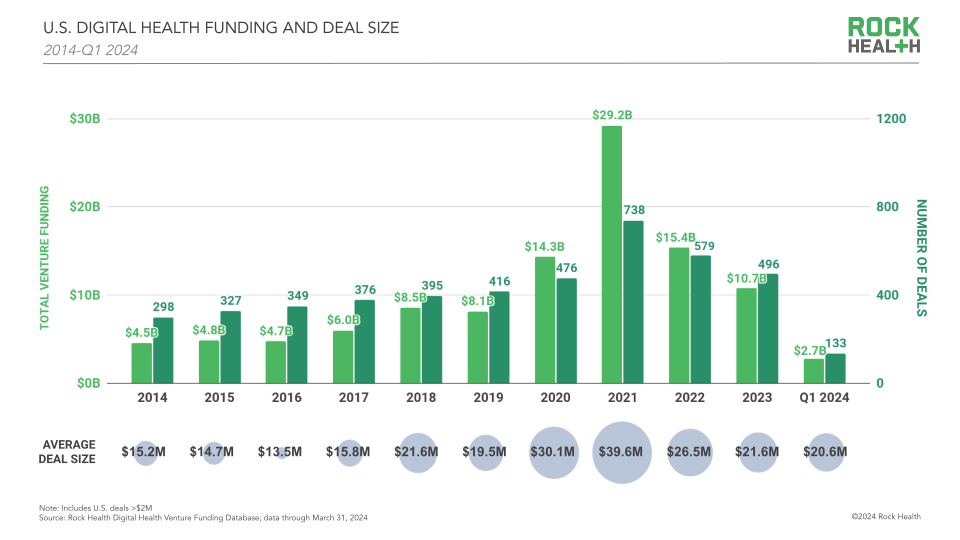
What You Should Know:
– Q1 2024 Digital health funding in the U.S. reached $2.7B across 133 deals, with an average deal size of $20.6M, according to Rock Health’s Q1 2024 Digital Health Funding Report.
– The report reveals the digital health funding landscape has undergone a significant shift in Q1 2024, marking a transition from a period of rapid growth to a more measured environment focused on long-term sustainability. This signals a shift towards smaller check sizes, indicating a more cautious approach from investors and a focus on companies demonstrating concrete value before securing larger investments.
Creative Financing and Unlabeled Rounds
The trend of creative financing measures seen in 2023 continues in 2024. Unlabeled funding rounds, which provide companies with capital without a specific funding stage designation, remain popular, accounting for 48% of deals in Q1. Additionally, companies are exploring alternative financing options like debt facilities with potential equity conversion, such as DecisionRx’s $100 million deal with Carlyle.
Significant AI Investments
Artificial intelligence (AI) continues to be a hotbed for investment, with 40% of Q1’s funding ($1.1 billion) going to AI-enabled companies. This surge is fueled by successful fundraising rounds by companies like Abridge (Series C – $150 million) and Zephyr AI (Series A – $111 million). The growth of AI in healthcare applications like clinical decision support and precision medicine is attracting significant investor interest.
Focus on Real-World Outcomes
A critical shift in 2024 is the increased focus on demonstrable outcomes. Investors are demanding evidence that digital health solutions deliver measurable improvements in patient care. This trend highlights the need for standardized methods of measuring and reporting outcomes, especially as solutions address complex conditions with diverse patient populations. Companies like Codametrix ($40 million) stand out for their commitment to evidence-based outcomes research.
Public Market Shakeup, Delisting and Reset Expectations

The pool of publicly traded digital health companies is shrinking. Q1 2024 saw three delistings, following nine in 2022. This brings the total down to 43, a significant drop from the 2021 peak of 54. The public digital health market is undergoing a significant transformation. Delistings of companies like Science 37 and Better Therapeutics have shrunk the publicly traded cohort from its 2021 peak.
This shift recalibrates expectations for startups aiming for an IPO exit. Companies like Veradigm delisting from the Nasdaq while simultaneously acquiring another company illustrate the changing landscape. Delistings also impact the valuations of private companies. Public market performance influences investor expectations for future returns, leading to potential downshifts in startup valuations. Publicly traded companies with strong financial performance like margin management and revenue visibility set a new benchmark for success.
Navigating the New Normal
- Preparing for Public Exits: Companies targeting an IPO or public exit need to adapt. Realistic expectations around exit strategies and valuations are crucial. Some may even explore dual-track processes, considering both IPO and M&A options.
- Shifting from Growth to Sustainability: Financial planning and forecasting need to become more conservative, resembling those of publicly traded companies. This shift from growth-focused projections to market-aligned guidance prepares companies for long-term success regardless of exit strategy (IPO or private sale).
The Road Ahead: Adapting and Innovating
The digital health industry is entering a new era characterized by greater scrutiny, a focus on outcomes, and the need for sustainable business models. This challenging environment also presents opportunities for companies that can adapt and innovate. Building a culture of data-driven decision-making, prioritizing outcomes measurement, and exploring alternative financing options will be crucial for success.
“Innovating in healthcare is hard, but hard can be your moat”
– Halle Tecco, Startup Founder and Investor, Founder of Rock Health

